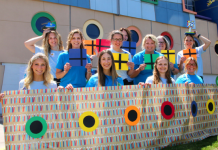It’s that time of year again. July 4th has passed. Summer is more than half over. Can you believe it? I grew up in Minnesota where schools did not start until after Labor Day, so here in Iowa it’s a new experience for me to start in the middle of August and know that summer is quickly passing.
As a mom, I see all four seasons for what activities I can do with my children. As a pediatrician, there are two seasons to my year: Sick Season and Physical Season. Physical Season is upon us and in full swing. If you have not yet scheduled your child’s physical, there is no time like the present. Sports physical, back-to-school physical, yearly checkup… everyone calls it something different, but no matter what you call it, it needs to be done. Every year.
Many people tend to forget about yearly checkups as soon as their children are out of the infant/preschool age group. They get reminded again when their children are in sports that require a signed form from a physician.
Physicals are important for many reasons, and what we tend to focus on may be unknown by parents. I find that I focus on some things more than others, depending on the age groups. Your doctor may do things a little differently, but here’s a good overview of what we are looking for during these yearly visits, and why they are important, even when your child is perfectly healthy.
All Age Groups
Growth
Is your child growing? Too much or too little? Height is important, but even more prevalent these days are problems with weight. Is your child eating enough? Are they eating too much or eating the wrong types of foods? At our clinic, we have now begun to focus much more on healthy appropriate growth for our patients. If a child’s BMI (body mass index) is too high, we have initiated a free program within our clinic to help address some of those issues. As a whole, all of the pediatric clinics at Unity Point Clinics are working towards offering this program so that we can help our children be as healthy as possible.
Behavior and Learning
Is your child having any issues with behavior or learning? How is school going? How is daycare? What types of activities do they enjoy at home or at school? Do you have any concerns about their behavior or development? Can we help with any discipline issues?
 Exercise
Exercise
Is your child getting enough daily physical activity? The recommended amount is 60 minutes most days of the week. Are they participating in any organized physical activities? Do they enjoy various physical activities?
Nutrition
This ties back to growth a little bit, but we want to know if they are eating a good variety of foods. Are they a picky eater? Are they getting enough calcium, iron, and other nutrients?
Sleep
Do you have any concerns about sleep? Is your child getting an adequate amount? Any issues with going to sleep or staying asleep?
Toileting
Hard, soft, big, or small…. We want to know about it all! Sometimes talking about poop can be embarrassing to older children, but it really is important to discuss. What goes in… must come out!
 Age Specific
Age Specific
Depending on the age of the child, I have different things I like to focus on at the well visit. This is based upon which stage of development they may be in at the time. This is a brief list and by no means all-inclusive.
2 months
- Smiling and cooing, how is bottle feeding or breastfeeding going?
4 months
- Cooing, laughing, rolling over, thinking about starting baby cereal?
6 months
- Baby foods, starting to sit, sleeping well?
9 months
- Sitting well, may be crawling or pulling up on furniture, babbling, possibly eating some table foods?
12 months
- What are their new motor skills? There is a wide variety of what babies are capable of at this age. Some are walking well, and others are just crawling. Some are eating all table foods, and others are still transitioning. Some are off bottles completely and others have not figured out how to use a sippy cup yet. Are they saying mama and dada yet?
15 months
- Walking? Eating table foods? Off bottles completely and using sippy cups or regular cups? Pointing at objects?
18 months
- Starting to use a fork/spoon? Walking well and/or running? Talking with about 8-10 words or so? (Keep in mind that a “word” is a sound that is used consistently to name an object.)
2 years
- Talking with a vocabulary of 50+ words? Putting 2 words together? (i.e. “More milk,” “thank you,” “up please”)
Well child visits are super important during these first 2 years of life as we track development to make sure they are learning and growing well. Talk to your doctor if you are concerned, but remember that all children learn and grow at a different rate and unless they are behind in multiple areas, it’s usually not a cause for concern.
Preschool Years (Ages 2-5)
- Vocabulary increases drastically and clarity of speech improves.
- Independent skills, such as dressing, eating, toilet training, etc?
- Play skills – are they developing socially?
- Vaccinations at age 5
School Age (Ages 6-10)
- How is school going? Learning in general? Concentration?
- How is everything socially? Friendships? Activities?
Preteen Years (Ages 11-12)
- Puberty – are they developing appropriately? On time, too early or too late?
- School, friendships, and activities?
- Vaccinations at age 11
- Discuss HPV vaccine
Teen Years (Ages 13-18)
- School
- Puberty
- Friends
- Work
- Activities
- Future plans?
- Discuss HPV vaccine
Sometimes during the school age physicals you think your child has forgotten how to talk…. We depend on you as parents to bring up any issues that need addressing. In the same way, we want to start teaching your teenagers how to take ownership of their own health visits, so we allow them to become more independent with age. It’s up to you as the parents, but please know that we want to teach them to be an active part of their health care, so we would like to come alongside you in teaching them that independence. (More about this topic soon on my personal blog, www.coopscoop.net.)
Yearly physicals can be quick and easy when your child is healthy and has no big issues. This is what we hope for. However, this is when we also screen for any other issues that may be lurking under the surface. We need to see your child when he or she is healthy and we need to see him or her yearly. By doing this, we get to know your child better and will be able to more quickly diagnose something if he or she is not at his or her best.
Meet Guest Blogger Dr. Tricia Cooperrider
 Hello! My name is Tricia Cooperrider, and I’m a local pediatrician in Waukee with UnityPoint Clinic.
Hello! My name is Tricia Cooperrider, and I’m a local pediatrician in Waukee with UnityPoint Clinic.
I grew up in southern Minnesota on a farm. I went to college in Minneapolis at the University of Minnesota. After graduation, I worked for one year doing Applied Behavioral Analysis therapy with children with autism. I then moved to Des Moines for medical school and pediatric residency at Blank Children’s Hospital. Following completion of my residency in 2011, I was able to find my dream job with the UnityPoint Clinic Pediatric location in Waukee. It’s been wonderful to grow my practice and develop relationships with my patients over these last few years. I look forward to watching these children grow up into amazing people.
I am not only a full-time pediatrician, but also a full-time mom and wife. I am constantly working to find the balance between work and home. I’m married to my husband of five years, Jeff, and we live in Waukee. I have a very energetic 3-year-old, Liam, and I gave birth to our second son, Noah, this past August.
I love my job taking care of children but struggle to be everything to everyone – home, work, family – it’s overwhelming! Despite the craziness, I’m in love with my life and my work. I hope to be able to offer you a little perspective from the world of pediatrics while keeping it real… because, let’s face it—textbook advice does not always line up with reality!
















